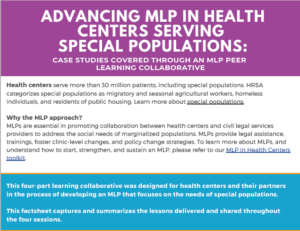Advancing MLP in Health Centers Serving Special Populations: Case Studies Covered through an MLP Peer Learning Collaborative
Monday, August 1, 2022
Health centers served more than 30 million patients in 2021, including HRSA-defined special populations (i.e., migratory and seasonal agricultural workers, homeless individuals, and residents of public housing). The medical-legal partnership (MLP) approach is essential to successful collaborations between health centers and civil legal services providers aiming to understand and address the health-harming social and legal needs of these often marginalized and hard-to-reach patient populations. In addition to helping patients receive legal assistance, health centers with MLPs have an improved ability to strengthen their workforce, foster clinic-level changes, and carry out policy-level changes.
In 2021, health center MLP practitioners gathered for a four-part learning collaborative designed to help them develop and improve their partnership models to better serve the needs of special populations. This factsheet summarizes the learning goals, case studies, and some of the salient points shared throughout the four sessions.

To learn more about how to start, strengthen, and sustain an MLP, please refer to our Health Center MLP Toolkit.
